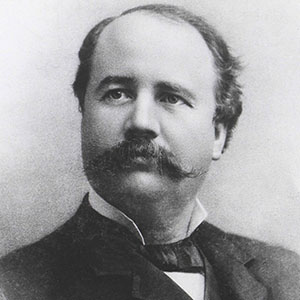Garret Hobart was the 24th Vice President of the United States. While he was only in office for two years, serving from 1897 until his death in 1899, he is credited with greatly expanding the role of vice president. Hobart earned the nickname, the “Assistant President,” by serving as a close adviser to President William McKinley and working closely with the U.S. Senate to further the President’s legislative agenda.
Early Life
Garret Augustus Hobart was born in Long Branch, New Jersey, on June 3, 1844. After attending his father’s school and then boarding school, Hobart attended Rutgers College. After graduating at the top of his class in 1863, Hobart went on to study law under a childhood friend of his father’s, Socrates Tuttle. Hobart was admitted to practice law in 1866. On July 21, 1869, he married Tuttle’s daughter, Jennie.
Political Career
Hobart entered the political arena after his father-in-law, Socrates Tuttle, was elected mayor of Paterson, New Jersey. After first serving as city attorney, Hobart was elected to the New Jersey Legislature in 1872. He quickly rose through the Republican ranks, becoming Speaker of the House in 1874. In 1876, he was elected to the New Jersey Senate. He went on to serve as its president from 1881 to 1882.
Hobart’s private law practice was also extremely successful. He represented numerous railroads, banks, and other large corporations throughout New Jersey, and the wealth he accumulated as an attorney tempered his desire to seek higher political office.
Although Hobart did not actively seek the nomination and was relatively unknown outside the State of New Jersey, he was named the Republican candidate for vice president in 1896. With Hobart on the ticket, New Jersey voted in favor of a Republican President for the first time in decades. McKinley and Hobart won by half a million votes and carried 23 of the 45 states.
Vice Presidency
Once in office, Hobart took the vice-presidency from a largely ceremonial position to a one of stature. McKinley and the members of his cabinet regularly sought Hobart’s advice on domestic and foreign policy matters, including the inception, prosecution, and conclusion of the Spanish-American War. Hobart also played an active role in presiding over the U.S. Senate, resolving questions of order himself rather than submitting them to Senate vote.
As Arthur Wallace Dunn, a veteran newspaper correspondent, observed, “for the first time in my recollection, and the last for that matter, the Vice President was recognized as somebody, as a part of the Administration, and as a part of the body over which he presided.” Dunn further characterized the Vice President as a “business politician,” whose knowledge of the “relations between business and politics” made his judgments extremely useful.
Hobart and his wife, Jennie, were also active in the Washington, D.C. social scene. They hosted lavish parties at their rented house at 21 Lafayette Square, which became known as the “Little Cream White House.” They also became close friends with President McKinley and his wife, Ida.
Beginning in early 1899, Hobart suffered from a serious heart condition, which caused weakness and fainting spells. While he retreated from the public eye and stopped performing many of his official duties, Hobart performed one last task for President McKinley — firing his Secretary of War, General Russell A. Alger. While Alger was a close ally of the President, he was marred by scandals during the Spanish-American War. When Alger failed to voluntarily resign and other cabinet officials were uneasy about pressuring him to do, the uncomfortable task fell to Hobart.
Hobart died on November 21, 1899. After his death, President McKinley stated, “No one outside of this home feels this loss more deeply than I do.” Hobart was succeeded by Theodore Roosevelt.








